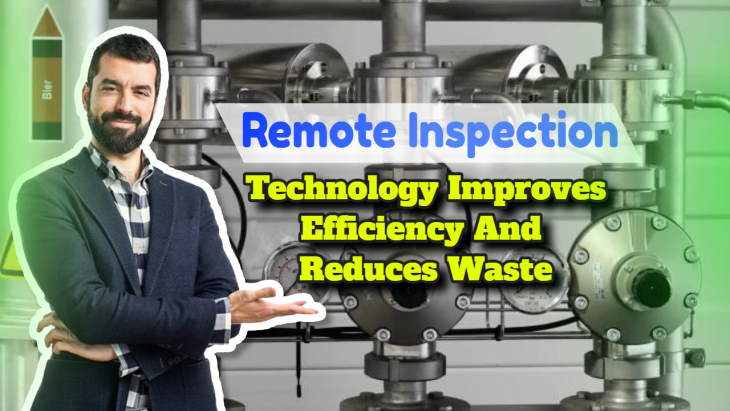While physical inspections of refuse sites have been restricted, the Environment Agency has relied on remote inspection technology for remote regulation of the waste industry. Meeting with site managers on Zoom and checking locations using CCTV video footage has allowed the agency to continue working closely with businesses to ensure they meet the legal requirements for good practice. As well as checking sites remotely, inspection technology is increasingly being used to improve the sorting process in recycling plants, and even reduce the waste produced in manufacturing and service industries.
Reducing Water Loss From Leaks

In England and Wales, 20% of water consumption is wasted through leaky pipes, and this constant loss could lead to some areas eventually running out of water completely. Although water leaks are common, they are also difficult to find and examine. Repairs are costly, often involving the interruption to water services in order to dig up and remove pipes for inspection and replacement. With flexible remote inspections devices, it is possible to locate leaks and breaks quickly and efficiently. A traditional borescope consists of a tube with an eyepiece at one end and a lens at the other, and can be used to view inaccessible pipework in real-time. Similar in design, a videoscope has a greater range of optics. View industrial videoscopes to learn how they are also able to record inspection footage, allowing it to be examined more thoroughly at a later time, and without causing disruption to service.
Minimising Contamination In Food Manufacturing
The Waste and Resources Action Programme (WRAP) estimates the total annual food waste from all sources in the UK to be around 9.5 million tonnes every year. Over 25% of food waste occurs in the food manufacturing process, where valuable resources are unnecessarily thrown away at considerable cost to producers. Food manufacturers already use metal detection, X-ray and other vision technology to check the weight of produce and verify codes and labels on processed products. By using these same remote vision systems to check for contamination early on in production, impurities can be removed before spoiling whole batches of processed food, so minimising waste and associated costs.
Using Robots In Recycling
 With a target in the UK to increase recycling rates to 50% this year, finding sufficient employees to oversee the sorting process at recycling plants is becoming more urgent. Although collecting different types of recycling together is more convenient for households, it does result in higher rates of contamination which need to be dealt with. Recycling sites use magnets to pick out metals, and near-infrared light to distinguish between different types of plastic. Now, companies are testing AI robots to see if they are a viable alternative to human workers. The robots are equipped with cameras to view items and grippers to physically separate materials. With the addition of machine-learning software, they can learn to become more efficient at identifying and sorting specific items.
With a target in the UK to increase recycling rates to 50% this year, finding sufficient employees to oversee the sorting process at recycling plants is becoming more urgent. Although collecting different types of recycling together is more convenient for households, it does result in higher rates of contamination which need to be dealt with. Recycling sites use magnets to pick out metals, and near-infrared light to distinguish between different types of plastic. Now, companies are testing AI robots to see if they are a viable alternative to human workers. The robots are equipped with cameras to view items and grippers to physically separate materials. With the addition of machine-learning software, they can learn to become more efficient at identifying and sorting specific items.
As the amount of recycling increases, technology can improve the speed and efficiency of sorting waste items. In other industries where precious resources continue to be wasted, remote vision systems help to quickly identify faults in processing systems in order to minimize costly losses.








Since lockdown everything is going remote it seems, but anything which reduces waste has my vote.
Good. Remote inspection is the way things are going and it will bring big benefits. Fewer jobs though for the average guy. Where will the jobs we need come from?
Thankfully there was remote inspection technology available at the start of the coronavirus because without it I don’t know how our business could have survived. Nice article. Helpful. Thanks.
A sophisticated remote robotic crawler is safer than a human inspector, especially in wastewater inspections and other situations where rules prohibit people from entering pipelines in favour of unmanned alternatives.
I loved reading this blog. It is very useful to me.
https://www.hpscreations.in/online-idcard-printing
Extremely educational post! This post gives really quality data. I’m now done it and observe that this post is truly amazing.